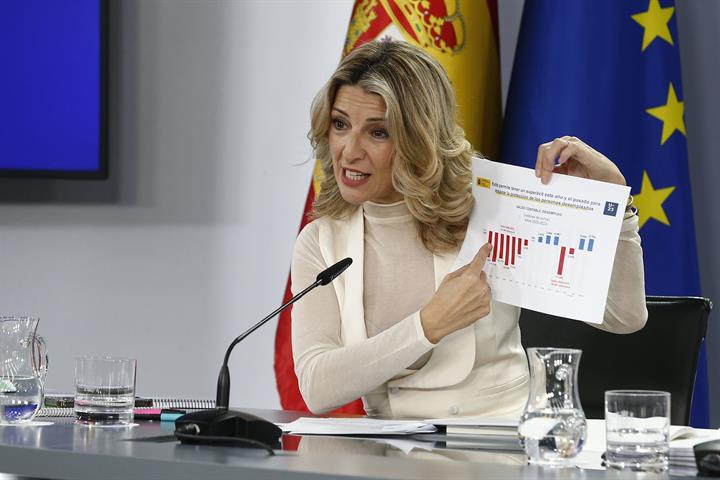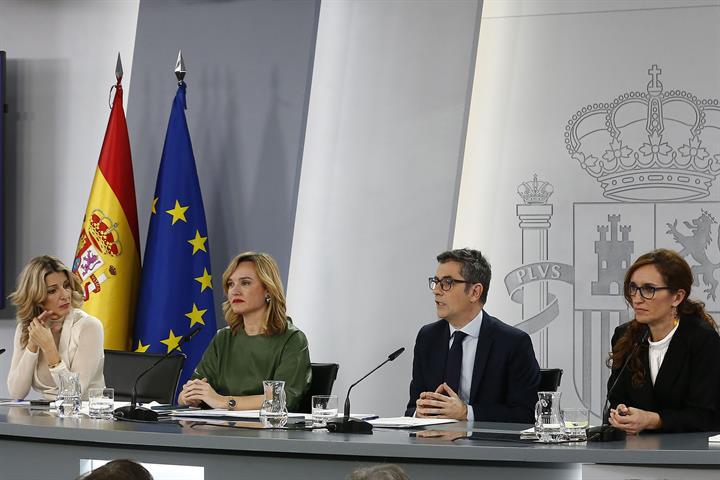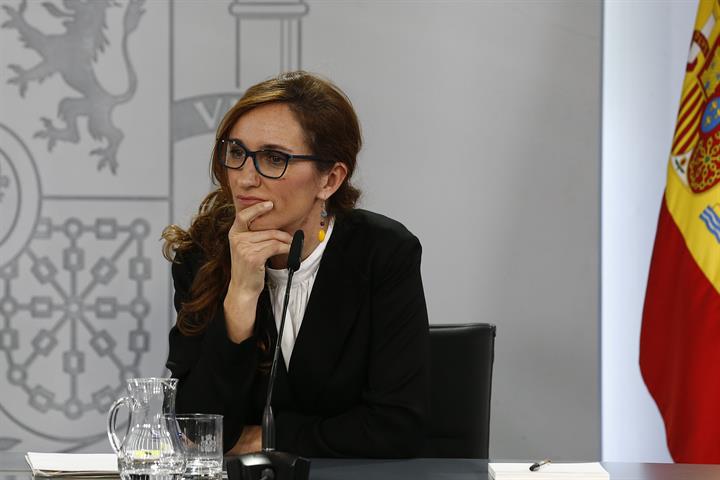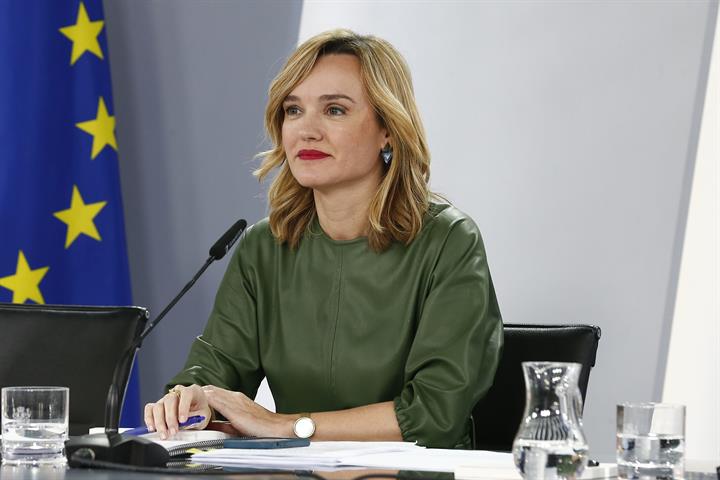Council of Ministers
Government of Spain simplifies, improves and extends unemployment benefits
Council of Ministers - 2023.12.19
The Council of Ministers has approved a royal decree simplifying and improving the level of unemployment protection , within the framework of the reforms committed to with the European Commission, completing the investments included in Component 23 of the Recovery, Transformation and Resilience Plan.
The second Vice-President and Minister for Work and Social Economy, Yolanda Díaz, stressed that the decision broadens the labour rights of workers and has an unprecedented gender impact because more than 56% of the people receiving this subsidy are women. She also pointed out that the over-55s are the group that most take advantage of the subsidy, which is concentrated in four autonomous communities: Andalusia, Valencia, Madrid and Catalonia.
Yolanda Díaz pointed out that unemployment benefit coverage in Spain has reached almost 68%, an unprecedented level of protection: "We have more coverage with the same expenditure, we have an unprecedented collection in our system that exceeds €27 billion". The vice-president added that after eliminating the government cuts that preceded Pedro Sánchez and with better social protection, there is a "fiscal surplus in the public employment service of €5.7 billion".
"We are a government that stands up for workers, protects them more, and is more socially effective and manages better. Economic efficiency is key to our mandate," she stressed.
In this context, Díaz recalled that the chief executive has approved a subsidy for domestic workers and has incorporated unemployment benefit for discontinuous permanent workers. The contribution base for this subsidy, she pointed out, has been raised to €1,575, as it is linked to the Minimum Interprofessional Wage (SIM), which has also risen to an unprecedented level.
Key points of unemployment benefit reform
 The Second Vice-President of the Government of Spain and Minister for Work and Social Economy, Yolanda Díaz, during her speech at the press conference after the Council of Ministers | Pool Moncloa/José Manuel Álvarez
The Second Vice-President of the Government of Spain and Minister for Work and Social Economy, Yolanda Díaz, during her speech at the press conference after the Council of Ministers | Pool Moncloa/José Manuel Álvarez
The Minister for Work and Social Economy explained that the administrative procedures for accessing the subsidy have been simplified, and that people who have exhausted their contributory benefit will not have to wait a month to apply for the subsidy.
The number of beneficiaries is extended by allowing those under 45 years of age with no family responsibilities to access the exhaustion allowance. Díaz added that the right to apply is recognised for temporary agricultural workers and cross-border workers from Ceuta and Melilla.
In addition, the amount of the subsidy is increased to 95% of the Public Multiple Effect Income Indicator (IPREM), the reference index for granting the subsidy. Yolanda Díaz detailed that it will be €570 for the first six months, €540 for the following six months and €480 for the rest of the period. The allowance for the over-52s remains at 80% of the IPREM.
Another new feature of the reform is that employment and receipt of benefit will be compatible for a period of 180 days for each new full-time or part-time job without any reduction in the amount.
The vice-president recalled that the benefit will be linked to a personalised itinerary of activation for employment aimed at increasing the employability of recipients who, she clarified, in 80% of cases do not exhaust the benefit.
Commitment with Europe and to the improvement of public services
The Council of Ministers has approved a package of reforms to implement the Recovery, Transformation and Resilience Plan (RTRP) in the areas of public service of justice, civil service, local government and patronage. The processing of some of these laws was already well advanced at the end of the previous legislature.
The Minister for the Presidency, Justice and Relations with the Courts, Félix Bolaños, recalled that the Government's commitment was to approve these initiatives before the end of the year. Once the Royal Decree-Law is published tomorrow in the Official State Gazette (BOE), the government will ask the European Commission for the disbursement of the €10 billion corresponding to the PRTR Addendum.
 The Minister for the Presidency, Justice and Relations with the Courts, Félix Bolaños, during the press conference after the Council of Ministers | Pool Moncloa/José Manuel Álvarez
The Minister for the Presidency, Justice and Relations with the Courts, Félix Bolaños, during the press conference after the Council of Ministers | Pool Moncloa/José Manuel Álvarez
Bolaños stressed that Spain is the state that is receiving the most European funds -€37 billion in transfers so far- and that "we are a country and a government that clearly fulfils its commitments to the European Commission and also to improving the lives of its citizens on a daily basis".
Digital and procedural transformation of the public justice service
The main part of the text concerns the improvement of the public service of justice. The minister described it as "the greatest advance in digital transformation in the history of justice which, moreover, becomes a more agile and public service".
A first block of measures seeks to "adapt justice once and for all to the digital world that is now a normal part of public administrations and also of citizens' daily lives", Bolaños explained, adding that from tomorrow, the right of citizens, businesses and all individuals to access justice electronically will be the rule rather than the exception.
Among the specific applications of this change, the minister pointed out the holding of hearings, trials and procedural acts by telematic means and the creation of the Justice Folder, which will allow anyone to consult all their files in different jurisdictional areas and courts, and the Electronic Judicial File. Interoperability between the different bodies involved in the work of justice is also strengthened. The Minister for Justice pointed out that "procedures that used to take months and involved paperwork that was unbearable for many citizens and professionals can now be dealt with in days".
A second block of justice-related reforms seeks to increase procedural efficiency to ensure speedy procedures and tackle the increase in litigiousness in Spain.
In criminal matters, too, hearings will preferably be conducted telematically. The courts and tribunals are also provided with tools to speed up contentious-administrative jurisdiction proceedings . In this area and in civil matters, the amounts of the verbal trial are reduced, family proceedings and the enforcement of sentences are streamlined and the 'witness procedure' is created: when there is a repetition of proceedings, all of them will be suspended except the first so that doctrine can be established on the others.
Modernisation of the Civil Service
 The ministers Yolanda Díaz, Pilar Alegría, Félix Bolaños and Mónica García during the press conference after the Council of Ministers | Pool Moncloa/José Manuel Álvarez
The ministers Yolanda Díaz, Pilar Alegría, Félix Bolaños and Mónica García during the press conference after the Council of Ministers | Pool Moncloa/José Manuel Álvarez
Another set of initiatives is aimed at modernising the public administration. Félix Bolaños indicated that many of them derive from the 2007 Basic Statute of the Public Employee and have not yet been implemented in some respects.
The changes include the strengthening of performance evaluation for all public employees and the establishment of a horizontal career path, i.e. the possibility to progress through the ranks from the same position in the public administration or public company. The figure of professional public managers is regulated in the sphere of the General State Administration - equivalent to deputy directors general - but also in the case of public companies.
Another key development is strategic human resources planning in areas such as the professionalisation of courts, a more streamlined selection model and the transformation of the National Institute of Public Administration (INAP) into an agency.
Improved local public services
Another group of measures focuses on municipalities, with the aim of making it easier for citizens to exercise their rights and receive public services as quickly and as closely as possible.
With this goal, a wide range of local public services will be deployed through digital means, and small municipalities in particular will be supported in the provision of these services. As an example, Bolaños mentioned that the municipal register could be updated in real time, so that changes would be reflected on the same day.
Increased tax incentives for patronage
Last, the royal decree-law improves the tax incentives for patronage, increasing from 35% to 40% the deduction percentages applicable to both individuals and legal entities. It also extends the amount of micro-patronage from €150 to €250, and updates the list of economic activities that give rise to corporate tax deductions.
Request to the Senate Bureau
The Council of Ministers has approved a request to the Bureau of the Upper House to revoke the decision to process the consideration of a bill to repeal the Inheritance and Gift Tax.
Bolaños explained that the measure would have a budgetary impact of some €2.8 billion and that the Constitution establishes that the agreement of the government is necessary for the General Courts to process any bill that reduces budgetary revenue. "We consider this to be absolutely flagrantly unconstitutional," said the minister, who added that if the Senate Bureau does not heed the request, the Executive will present an appeal to the Constitutional Court to stop the parliamentary procedure.
206 million euros for health improvements
 The Minister for Health, Mónica García, during the press conference after the Council of Ministers | Pool Moncloa/José Manuel Álvarez
The Minister for Health, Mónica García, during the press conference after the Council of Ministers | Pool Moncloa/José Manuel Álvarez
The Council of Ministers has approved the distribution of €206 million to the autonomous communities and the National Institute of Health Management (INGESA) for three projects: digital care, expansion of the genomics portfolio and improved care for patients suffering from ALS and rare diseases.
The aim of the measure is to homogenise care between communities by taking advantage of the leadership of the different regions in each project.
The Minister for Health, Mónica García, has stated that this completes the transfer of European funds from the PERTE for Vanguard Health, integrated in the Recovery Plan, totalling €2.33 billion in the years 2022 and 2023. He also said that "cutting-edge, innovative projects that will continue to strengthen our National Health System" are being implemented.
García specified that €110 million be allocated to the autonomous communities to develop Personalised Digital Care. They are aimed, for example, at monitoring and following up patients with diabetes and depressive disorders.
The Minister for Health also pointed out that €46 million will be devoted to expanding the portfolio of genomic medicine services. Specifically, €23 million is for the acquisition of healthcare technology, and a further €23 million for the development of information management and integration tools. "The aim is to have an interoperable information system aligned with research. It has to do with cardiological, neurodegenerative, oncological and metabolic diseases, and aims to make a repository of them," he said.
The Government will also allocate €50 million to improve healthcare for people with ALS and other rare diseases, responding to a historical demand from these patients. Mónica García announced that early diagnosis will be facilitated through neonatal screening programmes and will promote rehabilitation using exoskeletons.
The minister said that the Government intends to create a multilevel healthcare model and to provide patients with information through 50 nodes in the different autonomous communities.
Meeting between the President of the Government and the Leader of the Opposition
 The Minister for Education, Vocational Training and Sports, and Government Spokesperson, Pilar Alegría, during the press conference after the Council of Ministers | Pool Moncloa/José Manuel Álvarez
The Minister for Education, Vocational Training and Sports, and Government Spokesperson, Pilar Alegría, during the press conference after the Council of Ministers | Pool Moncloa/José Manuel Álvarez
At the press conference following the Council of Ministers, the government spokesperson, Pilar Alegría, said that they are waiting for the Popular Party to respond to the offer of a meeting between the president of this party and the chief executive.
"Not just the Popular Party, but the whole of Spain, know and are aware of the contents, the issues that the President of the Government wants to address, but they also know that they can raise any issue of interest to the Popular Party. We therefore call on them to tell us which day suits them best, either Friday 22nd or Friday 29th", said Alegría.
Non official translation





